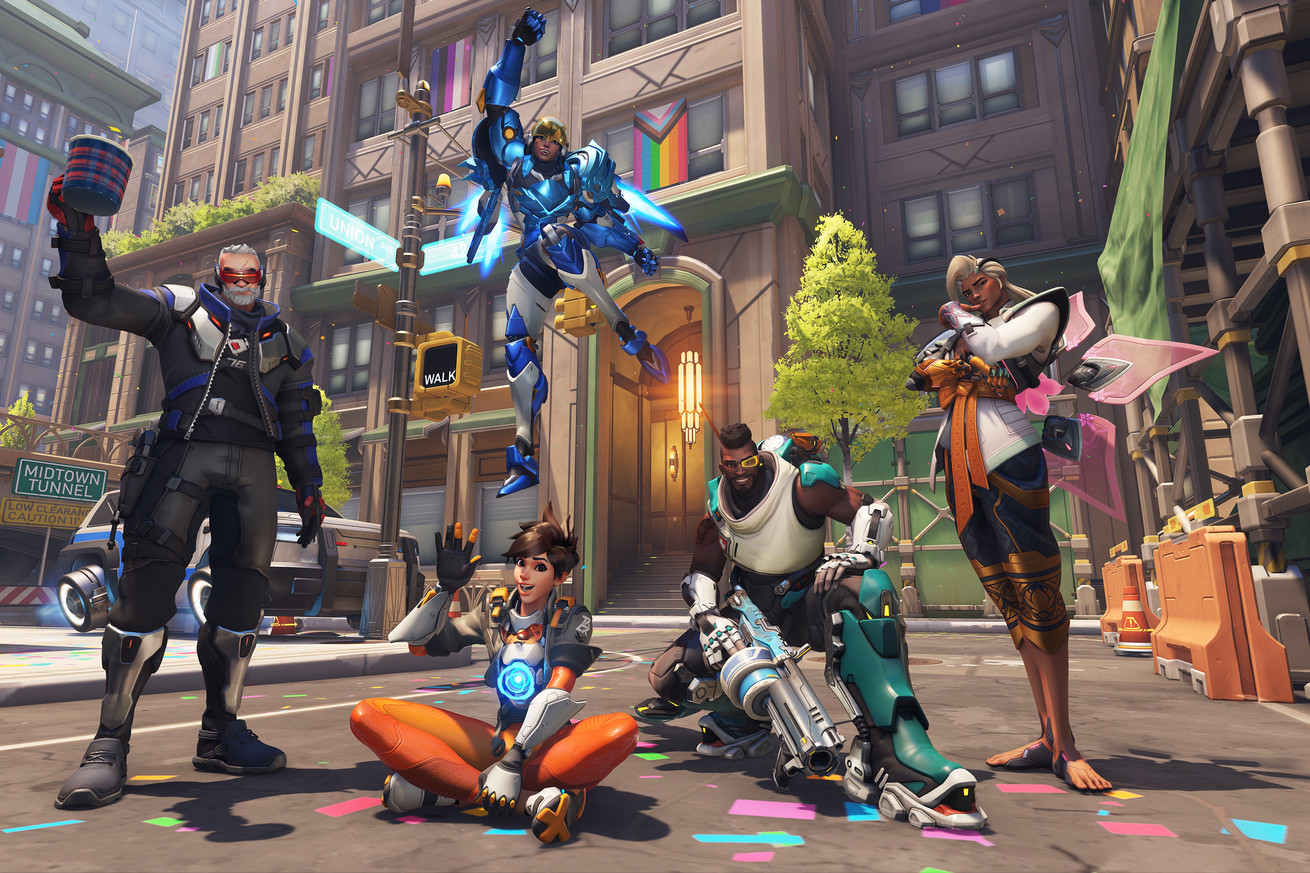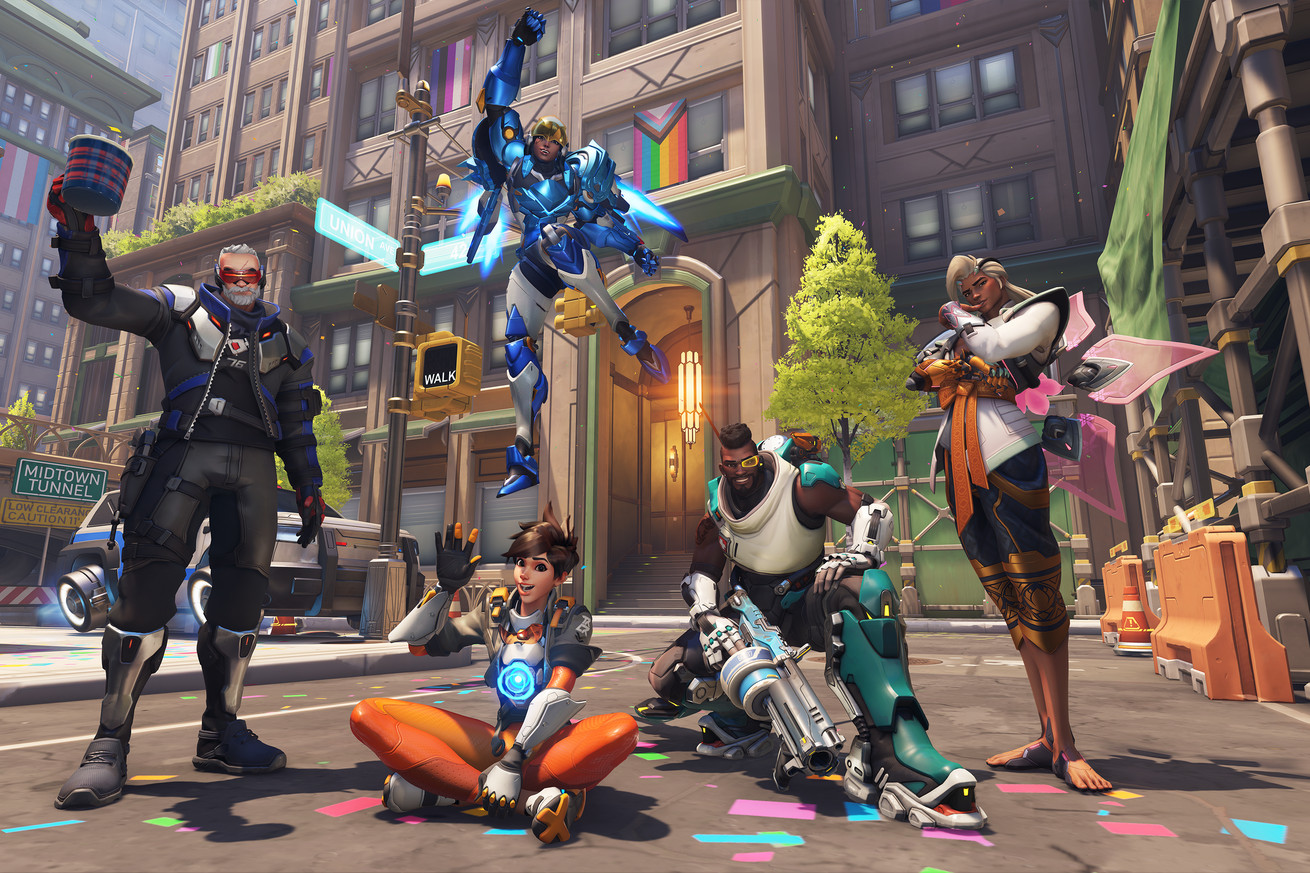
Overwatch 2 celebrates its first in-game Pride event
Overwatch 2 will celebrate its first-ever Pride event. Starting June 1st, the Midtown map will be festooned with Pride flags, the lesbian hero Tracer will have a picture of her and her partner added to the barracks in the Watchpoint: Gibraltar map, and players will get a host of icons and name cards reflect the breadth of queer identities and the Overwatch heroes who share them. The Verge had the opportunity to speak with the developers about this new event, gaining insight into what went into creating this event and what this means for Overwatch’s LGBTQ+ fans and characters.
“We want it to feel like the game is reflecting what’s happening in the real world. We do it for Halloween. We do it for Lunar New Year, too,” said game director Aaron Keller during the interview. “It’s important to carry this forward for Pride as well.”
Overwatch has been celebrated for the diversity of its characters, reflecting people from around the world. Shortly after the game’s launch in 2016, the Overwatch team released a comic identifying the hero Tracer — who, because of her prominence in the game’s marketing, has been essentially the face of the game — as a lesbian. In 2019, the gruff Soldier: 76 was confirmed as gay. More recently, the game’s latest support character, Lifeweaver, was introduced as pansexual — making it the first time an Overwatch character’s sexuality was included as a part of their announcement rather than added after the fact.
Over the years, there’s been lots of speculation from fans and oh so many fanworks discussing the sexuality of the Overwatch heroes. For this new event, Blizzard is adding two more characters to the roster of queer heroes: Baptiste and Pharah.
In a short story released as a part of the event, the rocket-spewing hero Pharah declares that she’s a lesbian to Baptiste, who’s a recent addition to the Overwatch team after his defection from the terrorist group Talon. While the story doesn’t outright state Baptiste’s sexuality, it’s implied that he’s at least attracted to men. From the in-game player cards that feature Overwatch’s queer heroes and the flags that represent them, Baptiste is bisexual.
Overwatch’s representation of queer characters is unique compared with how other shooters have handled including LGBTQ+ people in that it’s reluctant to pair off characters. Destiny 2 features a gay relationship between Saint-14 and Osiris, while Apex Legends has queer romantic relationships between several of its heroes. The revelation that Pharah is a lesbian will no doubt throw high-octane gasoline on the fan-made fire that believes Pharah and Mercy are a couple — a fire Overwatch itself does not have a problem with fanning.
But… Pharmercy fans will have to wait longer for their relationship to be enshrined in canon.
“We can’t talk about the relationships of the characters in our game,” said senior game producer Brandy Stiles. “We’re always excited by the relationships the players find for our characters. We’re always developing things, so who knows?”
This Pride event will feature a Pride-themed map and player cosmetics but, unfortunately, no voice lines. Overwatch has been criticized in the past for having queer characters like Tracer and Soldier: 76 but not having those characters’ identities explicitly outlined within the game itself. For both Tracer and Soldier: 76, their queerness was first called out in comics, and aside from a contextless spray for Tracer depicting her girlfriend Emily, the game didn’t allude at all to either’s identity.
Pharmercy fans will have to wait longer for their relationship to be enshrined in canon
Not having voice lines could feel like an extension of that. Blizzard is stating these characters are queer, but without voice lines of these characters affirming their identity, Blizzard will be able to preserve a kind of plausible deniability for the types of players who have a problem with queer characters. The developers are aware of that perception and say that’s not the case.
“We want it to be clear who these heroes are in all aspects of themselves,” Stiles said. “Their identity is not a secret. It’s a part of them, and we want to make that clear to our players.”
So even though there aren’t specific voice lines this time, this Pride event isn’t the end of queer expression in Overwatch. “You will hear them talk about things like this,” Stiles continued. “Maybe not necessarily in this Pride event, but it’s something we’re always thinking about and working on for the future.”
“Their identity is not a secret. It’s a part of them, and we want to make that clear to our players.”
Senior narrative designer Jen Stacey added to that saying, “We do have voice lines where characters’ sexualities and identities come up in the game planned.”
Amidst the new offerings for Pride, there is concern that players who choose to use the LGBTQ+ cosmetics might face more than the typical harassment that comes with playing an online shooter.
When asked if there was any moderation plan in place to address that, Keller replied that the team takes harassment seriously and pointed to the technology they’ve already implemented to combat harassment. After the interview, public relations manager Eric Elliott confirmed, “Our customer service team is planning increased moderation.”
Stiles expressed hope that, in addition to the moderation tools in place, the Overwatch community itself would come together to support each other.
“I’ve seen such beautiful moments come out from could have been really dark moments,” she said. “I’ve been called out for having a rainbow icon, then my team rallied behind me and got us out of gold.”
Overwatch’s pride event will go live on June 1st but not in every region. Queer people are not accepted everywhere (not even here in the US), and when asked about countries where LGBTQ+ content is censored or banned, the developers did share that there were some countries in which the Pride event would be blocked. “The tech allows us to prevent this content from going out to countries that have laws that aren’t tolerant of LGBT content,” Stiles said. “This helps us protect those players.”
The developers, citing legal reasons, couldn’t share a list of those blocked countries, and when asked if the team would ban the content if a country’s regulator asked, Keller said, “We do strive to follow the laws in different countries. And my personal value is that it’s better to be able to engage where you can than to not be able to engage with people at all.”
It’s great that Overwatch is finally adding a Pride event to the game, especially when so much of the game’s appeal comes from its diverse characters. Overwatch’s celebration of LGBTQ+ characters and, more importantly, players is vitally important as queer people, especially transgender people, are facing an unprecedented wave of social and legislative hate.

